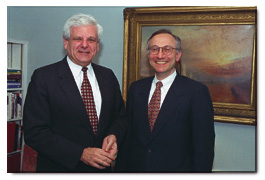Main Menu · Search · Current Issue · Contact · Archives · Centennial · Letters to the Editor · FAQs
![]()
Main Menu ·
Search · Current Issue · Contact · Archives · Centennial · Letters to the Editor · FAQs
 Provosts departing and elect, Carnesale, left, and Fineberg.Photograph by Jane Reed
Provosts departing and elect, Carnesale, left, and Fineberg.Photograph by Jane Reed |
Two Harvard administrators are heading west. Albert Carnesale, University provost since 1994, was appointed chancellor of the University of California at Los Angeles on March 6. His successor, who makes a much less taxing move geographically--from Huntington Avenue in Boston to Cambridge--will be Harvey V. Fineberg '67, dean of the School of Public Health since 1984.
Carnesale will start his new job in July, ending a 23-year Harvard career that began with a faculty appointment in 1974 and has included service as academic dean and dean of the Kennedy School of Government, and (during Neil L. Rudenstine's 13-week medical leave two winters ago) as acting president. Hailing a "devoted colleague," Rudenstine said, "It has been an absolute privilege and pleasure" to work with Carnesale.
Assessing his tenure in Massachusetts Hall, Carnesale cited substantial progress in several areas. The interfaculty initiatives (on the environment, health care, the mind and brain, ethics and the professions, and schooling and children) have each produced "an exciting program of teaching, research, and outreach, truly extending across the boundaries of the disciplines and professions." Heightened focus on information technology has prompted practical steps to upgrade Harvard's administrative systems and forthcoming policy papers on the ownership of Harvard-based intellectual property and on related partnerships with commercial enterprises. Finally, he noted the continuing oversight, in collaboration with the faculties, of Harvard's central administrative budget.
Turning to unfinished business, Carnesale highlighted the University Campaign's efforts to secure permanent funding for Harvard-wide initiatives (the interfaculty programs, the library system, and information technology). Long-range academic planning involving all the schools, begun when the Campaign was launched, must be a continuing process, he noted, citing as an example the schools' nascent plans for international studies. "All are planning to expand in that domain," he said. "For intellectual and financial reasons, that must be done collaboratively."
Carnesale said he was attracted to UCLA precisely because it is a public school--"That's where most of the challenges are in higher education"--and is "on a rapid trajectory upward, with enormous potential to be a great university." Thus, "It's not a place that looks like Harvard but isn't as good. It's a very different kind of institution." For Carnesale, who took his doctorate and first taught at North Carolina State University, the new job, in a sense, is a homecoming to public education.
To his successor--then unnamed--Carnesale said, "The ultimate measure of how well you're doing is, how excellent is this University, in its teaching, in its research, and in its service to society?" The provost, as one of the few academic officers in the central administration, must focus on the goal of "making the whole greater than the sum" of the University's many diverse parts.
It was that talent that Rudenstine cited in an April 3 news conference announcing Fineberg's appointment. "He is genuinely interested in the cross-cutting aspects of the University" because the School of Public Health is inherently multidisciplinary, the president said of the provost-designate. "He thinks that way instinctively."
The 51-year-old Fineberg has done so for a long time. He has been at Harvard since enrolling in the College in 1963; subsequently he collected a master's in public policy from the Kennedy School and his M.D., both in 1972, and a doctorate in public policy, again from the Kennedy School, in 1980. From 1973 to 1981 he held faculty appointments in both the Kennedy and public health schools, before receiving tenure at the latter in 1982. Within two years, he became dean.
As dean, Fineberg launched centers and institutes devoted to AIDS, cancer, and cardiovascular disease, and to such problems as children's health, health and human rights, and risk analysis. The number of degree candidates has increased 80 percent, to 764, and the budget has more than tripled, to more than $120 million annually. For at least the past decade, according to the University's financial reports, public health has by a wide margin enjoyed the fastest growth in real income of any of Harvard's schools. And it has been notably successful in fundraising, having met its goal for the University Campaign two years ahead of schedule.
Of his new responsibilities, Fineberg said that, as Harvard's second-ranking academic officer, "with a purview across the whole institution," he saw the provost's task as "helping to draw together faculty members who are in diverse parts of the University."
"The University succeeds marvelously in its programs based in the faculties," he said, "and can do even better in drawing them together. I think we're on the right path."
Main Menu ·
Search · Current Issue · Contact · Archives · Centennial · Letters to the Editor · FAQs
![]()